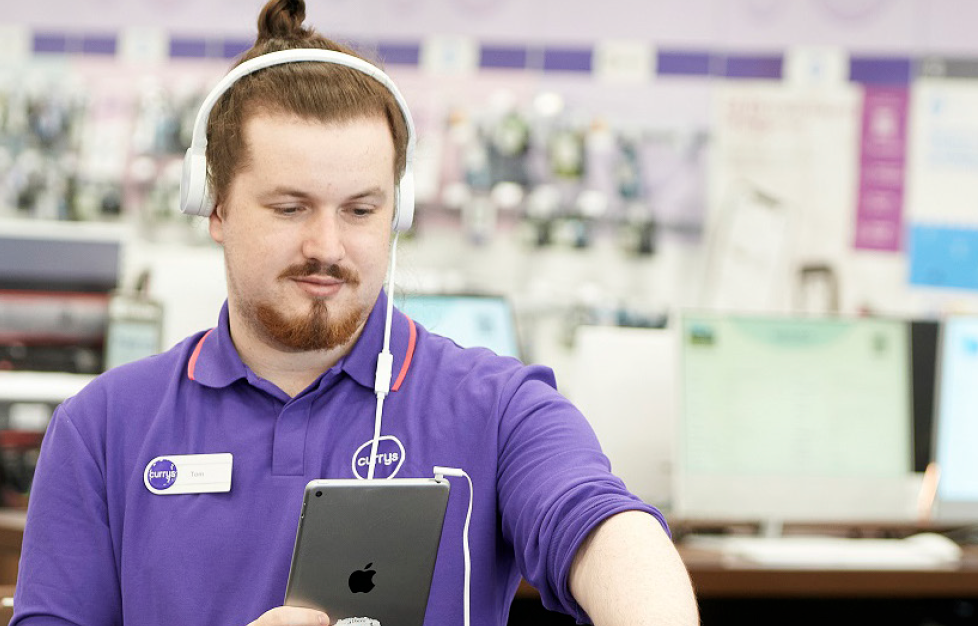Demand for real human expertise is on the rise, as consumers become increasingly conscious about what and how they’re spending, in an ever-changing Covid world – that’s according to a new Future of Tech Retail, report from the all new Currys, the UK’s largest tech retailer and The Future Laboratory.
The pandemic has undoubtedly created heightened tech-dependency, with a whopping 68% of people claiming they’re completely reliant on their electronics, using an average of 11 devices a day and for up to eight hours.

According to Currys, smart devices and security in particular have seen exponential growth, with multi-connect devices like the Google Nest up 68% YOY, as people look to simplify their home life with just a click of a button. Other tech, such as smart fridges, have seen huge uplift in the twelve months, with people eating more when working from home, but also looking to spend less on big food shops and thus needing tech to help them preserve food and reduce waste. And, in the months when lunchtime walks became a go-to work out for all, smart watches and fitness trackers also became a must-have for consumers – up 182% since before the pandemic.
🏆
The 2024 Creative Retail Awards are open for entries.
The Creative Retail Awards are much more than a mere accolade; they represent the pinnacle of achievement in the retail industry. Garnering a nomination or winning one of these awards is a testament to innovation, excellence, and leadership.
www.creativeretailawards.com
However, as innovation in the market increases, so does consumer confusion. This latest report from Currys and The Future Laboratory reveals more than half of all Brits (59%) think there are too many options when buying new tech, and a further 68% said they felt overwhelmed when researching pre-purchase, which makes shopping for the right product without the proper expertise a real challenge. What’s more, at a time where subconscious commerce, in which we click and buy in a zombie-like fashion, has become the norm, it’s easy to see why people are ending up with the wrong products in their hands.
With more and more shoppers buying online over the last 2 years, the consumer need for human intelligence needs to be met, which is why Currys has been evolving its hybrid retail format of online and in-store shopping, helping tech buyers to access real-life human help. In Summer 2020, the retailer launched its pioneering 24/7 online ShopLive platform with nearly 2,000 ShopLive colleagues available at the click of a button, ensuring shoppers could still obtain in-person advice from an expert colleague via their laptop, tablet or phone, without having to visit a store.
Training is an intrinsic part of the business at Currys, all experts are trained to listen and understand the customer’s needs, so the right products are enjoyed for the right lifestyle and the latest complicated tech jargon is busted. On top of the standard training, the ShopLive colleagues have received an additional 4,286 hours of training to ensure they are not only experts but can give expert advice over video. It’s clear the additional training has paid off as the service has proven to be popular with over 3m customers engaging with it to date and Currys has seen firsthand the relationship between shopper and retail colleagues as conversion rates are four times higher after assistance in ShopLive compared to unassisted buying and customers going it alone.
The report shows that tech purchases are more complex than other purchases as more than half of people in the UK have bought incorrect tech at some point in the last year, thanks to a mix of fake reviews, false endorsements, and complicated tech jargon. Some categories, like green tech, are much more complex than others and require real-life expert support to make the right buying decision.
The top 10 products named as the most difficult to purchase without real-life expert support:
- Laptops
- Mobile phone
- TVs / Smart TVs
- Smart home tech / connected home (e.g. Google Nest, Smart Heating, Amazon Echo)
- Desktop computers
- Smart fitness / smart lifestyle tech
- Washing machine
- Home cinema systems
- Cameras
- Tablets
These items then had to be returned, sold on, or gifted to others, creating a longer, more complex buying process which ultimately plunges shoppers into a convenience paradox.
This convenience paradox, teamed with a rise in conscious consumerism, has propelled concerns around AI forward, driving distrust amongst the public and resulting in more and more Brits turning their backs on bots, rejecting purely robot retail in favour of helpful H.I– or human intelligence.
When surveyed, one in four consumers said they found online reviews generally untrustworthy, with nearly half of all consumers (48%) claiming they’d prefer to speak to a real-life advisor before buying a piece of tech. This goes up to 77% if it gets them to the right product quicker. A quarter of all consumers questioned by Currys also agreed that they now rely more on person-to-person advice than chatbots and AI when looking at tech products, to ensure they make an informed decision.
In fact, dissatisfaction with robot retail is so high, just 3% of people believe brands should be focusing on automated chatbots and algorithms, with over a third (41%) stating time should be spent focusing on human expertise.
Michelle Gorringe-Smith – Director of Stores at Currys comments on the report findings: ‘Tech products that make our lives easier have gone from invisible to visible in the last 2 years, which is why we have spent nearly £25m in training our colleagues to establish our customers’ needs so they can find them the right tech, whether that’s the best washing machine for a family or a fitness tracker for a marathon runner.’
Simon Peck – Head of Omnichannel at Currys ‘People are happy to shop online by themselves in some categories, but when they are spending a lot of money, like premium TVs, they want to speak to an expert. The success of ShopLive, which we launched in the pandemic, highlights this customer need for human advice as it provides a seamless link between store and online.’
Natalie Berg, founder, NBK Retail ‘Five thousand four-and-a-half-star reviews don’t mean anything if you don’t trust that they’re genuine and they’ve come from an actual person. Then, your staff become your greatest assets.’
Dr Dimitrios Tsivrikos, consumer and business psychologist, UCL ‘We might develop complete 100% convenience, and incredibly robotic in-store behaviour, but as long as we have emotions and blood, meaningful interaction will continue to be incredibly important.’
Trenton Moss, author, Human-Powered ‘To provide real, personal support for a complex purchase decision like an expensive bit of electrical equipment, and in particular for those people that value human relationship for a high-value, complex purchase, they’re going to want a personal expert advisor.’
Martin Raymond, co-founder and editor-in-chief, The Future Laboratory ‘The next generation of consumers are not only going to be digital natives, but phygital natives, constantly walking a blurred line between online and offline realms. They’ll be impatient with retailers who don’t offer service that enables them to pinpoint the right tech quickly.’














